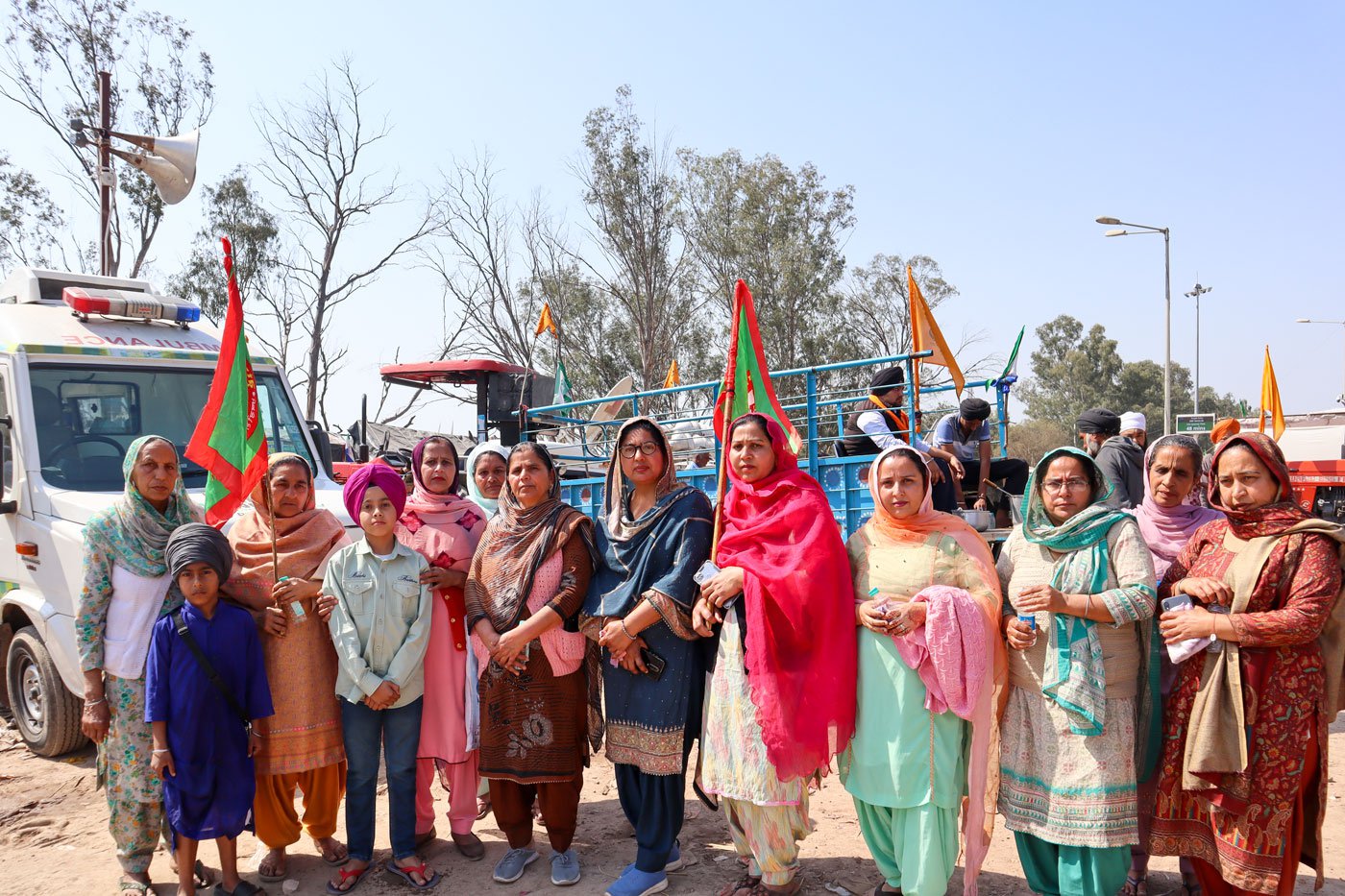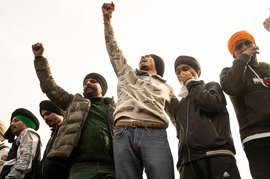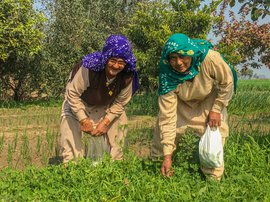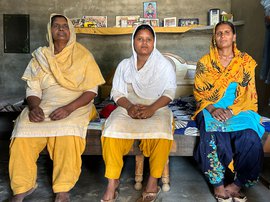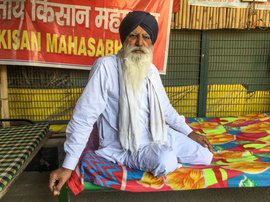“It has been over two years since we have returned from Delhi. The government had said they would fulfil all our demands, but no one called us farmers to discuss those demands,” says the 60-year-old Charanjit Kaur, resident of Sangrur district in Punjab. She and her family grow wheat, paddy and a few vegetables for household consumption on their two acres of land. “We are fighting for the rights of all the farmers,” she adds.
Charanjit is sitting with her neighbour and friend, Gurmeet Kaur among a group of women at the Shambhu border in Patiala district. The warm afternoon sun is falling on the group. “They [government] didn’t even let us go to Delhi,” says Gurmeet. She is referring to the multilayer barricades of concrete walls, iron nails, and barbed wires that have been placed on the roads along the Haryana-Punjab borders, and then along the Delhi-Haryana borders, stopping protesting farmers from reaching Delhi. Read: ‘I feel imprisoned at Shambhu border’
The farmers gathered here say that the Centre has failed them on many counts: guarantee of minimum support price (MSP) as per the recommendations of the Swaminathan Commission , a complete waiver of debts for farmers and farm labourers, justice for the farmers affected in the Lakhimpur-Kheri massacre, arrest of the culprits, a pension scheme for farmers and labourers, and compensation to families of farmers who were martyred in the 2020-2021 protest .
A few weeks ago on February 13, when these farmers began
a peaceful march to the national capital to press for their demands, they were
met with tear gas, water cannons, rubber bullets from pellet guns, fired by the
Haryana police to stop them from moving further.


Left: Neighbours and friends, Gurmeet Kaur (yellow dupatta) and Charanjit Kaur have come to Shambhu border from Khurana village in Punjab's Sangrur district. Right: Surinder Kaur says, ' We are protesting for our rights, we will not return until our rights are met'


Left: Surinder Kaur, along with other women, praying for strength to carry on with the protest. Right: Women sit near the stage put up at Shambhu border
Surinder Kaur’s son is among the protesters at the Shambhu border between Haryana and Punjab. “ Sade tey mobile, television band hi nahi honde. Asi dekhde hai na sara din gole vajde, tado mann vich haul jeya paenda hai ki sade bache tey vaje naa. [Our mobile phones and televisions are constantly on. As we see tear gas shelling persisting through the day, we worry for our children’s safety],” she says.
Surinder Kaur is from Khoje Majra village and arrived on the morning of February 24, 2024 to participate in the candlelight march for 22-year-old Shubhkaran Singh, who died following a clash between security personnel and protesting farmers at another Haryana-Punjab border in Khanauri.
“We are protesting for our rights ( hak ), we will not return until our rights are met,” she asserts. The 64-year-old is accompanied by her daughter-in-law and grandchildren.
Surinder Kaur’s family of six rely on their two acres of farm in Fatehgarh Sahib district where they cultivate wheat and paddy. She says that MSP for just five crops is not enough. “ Mitti de bhav laende hai sadi fasal [They buy our crops for next to nothing],” she says referring to the other crops like mustard sold in and around their fields.
“Despite our peaceful protests, why do the police resort to such extreme measures?” asks a worried Devinder Kaur whose sons have been at the protest site since the beginning. A resident of Landran village in Sahibzada Ajit Singh Nagar district of Punjab, Devinder Kaur too had come with her family – daughters-in-laws and grandchildren aged 2, 7, and 11.
“The government provides MSP on only two crops – wheat and paddy. Then they ask us to diversify to other
crops. How are we to
diversify under such circumstances?” Devinder asks. “The maize we grow is
brought at a price of 800 to 900 rupees a quintal, as against the Rs. 1,962 a quintal MSP on maize set by the Food Corporation of India for 2022-2023.”


Left: Devinder Kaur has come with her family from Landran village in Sahibzada Ajit Singh Nagar district. ' Everyone can see the injustice the government is committing against our children,' she says. Right: Farmers hold a candle light march for 22-year-old Shubhkaran Singh who died on February 21 at the Khanauri border during the clash between Haryana police and the farmers


At the candle light march for Shubhkaran Singh. The farmers gathered here say that the Centre has failed them on many counts
Nearly 200 metres from the barricades, standing on a makeshift stage built on a trolley, farm leaders are delivering speeches and updating protesting farmers on upcoming events scheduled ahead. People are seated on durries spread on the highway; a four-kilometre long caravan of thousands of tractor trolleys stretches towards Punjab.
A farmer from Rajpura, Punjab, Parampreet Kaur, 44, has been here at Shambhu since February 24. Tractor trolleys from the villages of Amritsar and Pathankot have four to five women in each one. They stay for the entire day and the next day, other groups of women come. The lack of toilets at the protest site, they say, is why they cannot stay overnight. “I felt the urge that someone from the family should come in support,” says Parampreet. Her 21-year-old son is ill and could not come so she has come instead with her relatives. The family own 20 acres of land on which they grow wheat and paddy, but since her husband’s stroke in 2021, they have not earned anything from the land.
“No one is interested in cultivating on the land on lease also because the groundwater there has been polluted from the chemical released from a factory nearby,” she adds.
Amandeep Kaur and her family own 21 acres of farmland in Bhatehri village in Patiala district. They mainly grow wheat and paddy. “The value of our crops remains negligible while they’re in our fields. However, once they leave our possession, they are sold at a double price in the market.”
Speaking about the protest she says, “protesters are unarmed, yet the government is resorting to using weapons against its own citizens. There is little reason to remain in India. It’s no wonder the youth are leaving the country. Not only are there limited jobs here, but when we assert our rights, we’re met with such treatment."
